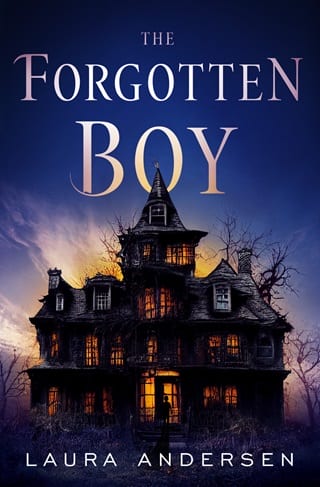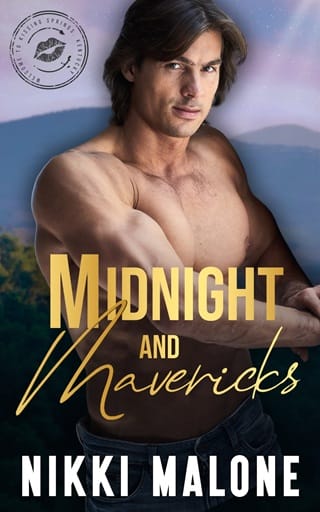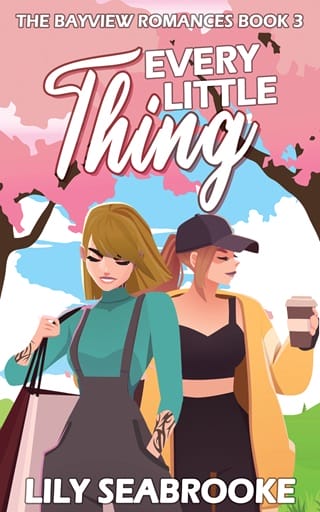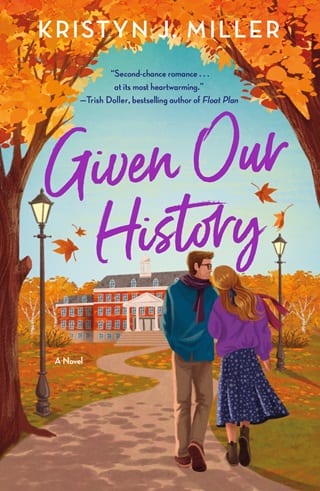Chapter Six
CHAPTER SIX
JULIET 2018
The great advantage of any physical work after months of lying in bed watching Netflix was how easily it exhausted Juliet. She was in pajamas by seven o'clock her first full day, which didn't seem so early considering it had been dark outside three hours earlier. She intended to read, but when she jerked awake hours later, the book had fallen on her chest still open to the first page. She rubbed her breastbone where it had hit her and thought that at least there wasn't anyone to see a bruise.
Rolling over, Juliet checked her phone: 4 a.m. With a groan, she realized she had to get up and pee.
Why did beautiful old English houses have to be so freaking cold? Even in her thermal tee and wool socks, Juliet was shaking by the time she reached the toilet at the other end of the corridor. She pulled the cistern chain and dashed back to her room to the sound of creaking pipes.
And not just the pipes. As the banging subsided along with the flow of water, Juliet heard something soft and whispery snaking through the air. Like the intake of breath just before someone speaks, or the echo after a footstep.
She whipped around in her bedroom doorway, but of course it was empty—the entire fourteen-thousand-square-foot house was empty. It was freezing outside, and anything she thought she heard was only mice moving through the walls in search of warmth and shelter. Oh please, let it only be mice , she thought as she took refuge back in bed. No rats. Or raccoons.
She didn't hear anything else before finally drifting back to sleep around dawn.
When she woke again, Juliet was astonished to realize that she'd slept until ten—and that she was starving. Two things that had not happened in so long. She scrambled into jeans and a wool sweater and was halfway down the main stairs when she heard the definite sounds of someone in the house. Someone real, unless ghosts had learned to vacuum.
She was prepared with a smile when she reached the ground floor and found a woman vacuuming in the room to the right of the central hall. This must be Rachel Bennett, whom Nell had said would come once a week to clean. Juliet moved carefully into her line of sight so as not to alarm her.
Rachel switched off the vacuum the moment she saw her. She was younger than Juliet had expected—midthirties, at most, with a cheerful face and round cheeks with matching dimples.
"Ms. Stratford, I hope I didn't disturb you."
"Juliet, please. Of course not. I just wanted to say hi and then I'll get out of your way."
"Do you want breakfast? I'd be happy to make something."
"Oh no," Juliet said, horrified. "You're not—I mean, I can cook."
Rachel clicked the vacuum into a standing position. "You'd be doing me a favor. I'd rather cook than hoover any day. Besides, I'm dreadfully nosy and this will give me a chance to find out your darkest secrets."
You're far too happy-looking to want my darkest secrets, Juliet thought. But she couldn't think of a graceful way to continue saying no without sounding like Rachel did work for her.
"Thank you, Ms. Bennett. When I say I can cook, I use the term loosely."
"It's Rachel. I brought fresh bread with me. Come tell me what else you want."
When Rachel Bennett said fresh bread , she meant "kneaded by hand and taken out of the oven an hour ago." Also raspberry jam ("simple to freeze jam in the autumn"), a dozen eggs that had never seen a supermarket, and local bacon. While Rachel fried the bacon and eggs, she chatted away about herself.
"I went south for university and stayed in Leeds when I got married. My wife, Antonia, is in IT and I temped in between having three boys, but all I've really ever wanted was to come back to the farm. Then my mum died last spring, and my dad needed help round the house and caring for my great-aunt, so the boys and I moved up here in June. Antonia was able to negotiate working remotely two days a week, so Tuesdays to Thursdays she's in Leeds, and the rest of the time she's here. Drives me mental complaining: ‘the sky is too big' or ‘the farm is too smelly.' But she's just taking the piss—she knows we love it."
It wasn't easy getting a word in, which was rather restful. Not like with Duncan, who had simply loved the sound of his own voice. Juliet even managed a couple questions: "Your boys didn't mind moving? How old are they?"
"Eight, seven, and five. The oldest complained about switching schools, but his heart wasn't in it. They love running wild outdoors and the farm animals. What boy wouldn't?"
Would you have loved it, Liam? Would you have run wild through the Maine woods and along the beach?
"So you're here taking inventory and throwing out the junk," Rachel continued, neatly slipping two over-easy eggs onto a plate and handing it to Juliet. She poured herself a cup of tea and leaned against the worktop. "Word around here is you're a professor too." This argued some very good sources of local gossip.
"Not quite that grand. I haven't even finished my doctorate yet." She took a bite of egg and nearly moaned in delight.
"What's your subject?" Rachel asked.
"Overall, I focused on Victorian and Edwardian women's history. For my doctorate, I started out researching the history of women in the workplace before and during World War One. But these days I mostly teach introductory history courses."
Duncan hadn't liked that. Teaching freshman students how to properly use the university library for research wasn't impressive enough for his wife. He'd been pushing her to finish her dissertation for years. Which was probably why she'd dragged her feet for so long. Her own passive rebellion.
With Rachel looking at her as though she were truly interested, Juliet expanded on the idea that had seized her the moment she'd learned about Havencross. "I've always been fascinated by the 1918 flu pandemic. I know Havencross was a school then. I'm considering writing about Clarissa Somersby. She was very young to be a school headmistress, and I'm curious how she coped when the flu swept through the area." Juliet took a sip of tea. "Of course, I'll need to dig deeper to see if there's really enough here to support a book-length dissertation."
"I should think so," Rachel said, with an unexpected hint of amusement. "The flu hit the school just as the war ended. They only had one medical officer, a nurse who'd served in France. For two weeks, everyone at Havencross who didn't fall ill worked themselves that way taking care of the others."
Juliet laid down her fork—she'd eaten almost embarrassingly fast—and eyed Rachel thoughtfully. She sounded as though she were speaking about something that had happened just a few years ago. "How do you know all this? Because if this is the kind of local oral history available, then I'm very interested."
"We've got more than just oral history," Rachel said, with a grin that hinted at smugness. "The Havencross school nurse was actually my great-grandmother. Some stories have been passed down in the telling, but my great-aunt Winnie has written sources if you'd like them. I'm pretty sure they're packed away in trunks in the farmhouse attic."
"Would your family mind if I went rummaging through them?"
"Mind?" Rachel laughed. "Aunt Winnie will be delighted. She's tried to get us interested in that stuff, but only the major points have managed to stick. Come over some afternoon, stay for dinner. No need to phone ahead. Just be prepared for more stories than you'll know what to do with. She'll probably even throw in the Havencross ghost too, so I hope you're not easily frightened."
"I imagined there must be a ghost. No house stands this long without collecting tragedies." Juliet knew all about tragedy and ghosts. She'd left home because she was being haunted. No stranger's past and death could be worse.
Rachel returned to the vacuum and Juliet decided to take a look at the pile of local histories she'd gathered from Clarissa's rooms. She took out her notebook and began skimming for references to Havencross School, 1918, and influenza. But she got sidetracked in the very first one she picked up. It was so old it was mimeographed, with the overwritten prose of a certain kind of local historian.
Havencross, though known today primarily as the showplace of Gideon Somersby, his large family, and his even larger railroad fortune, has a much deeper past. The name comes from Havencross Priory, a monastery active from the twelfth to the late fourteenth century. Though little remains standing, parts of the cloister were built into the foundation of Havencross Hall in 1430. The land was the gift from the boy king, Henry VI, to a useful local lord who helped patrol the Scottish border. It remained in the Deacon family only until 1471, when the last family members vanish from the records.
Legend, which must always be treated with care, claims violence in the family's end, and there have been many reports in the intervening centuries of the sighting of a small boy. Though one does not wish to encourage a belief in the supernatural, one also admits that the Wars of the Roses were a time of upheaval and death, not least in 1471 during Warwick's Rebellion. Some few claim the boy must be one of King Richard III's murdered nephews, but one need only note that the eldest was barely born in that year and so could hardly have to do with any mystery of that decade.
Juliet thought, Well, that explained Clarissa's interest in the Wars of the Roses . It was an intriguing story, though she wondered why it had caught the attention of an old woman in her last years. She made herself a note to ask Rachel's great-aunt what she knew of Clarissa Somersby. Maybe the woman could tell her more than the few stories Juliet had gathered thus far.
 Fullepub
Fullepub 



